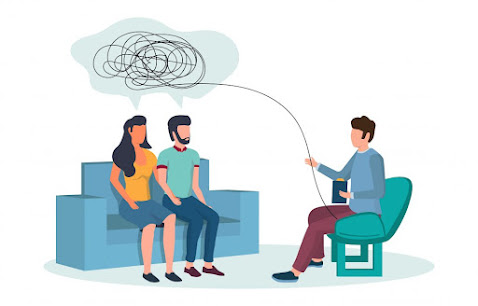Sexual Addiction - Support For the Partner of a Sexual Addict
Can the spouse of a sex addict obtain individual assistance for the effects of their partner's sexual addiction? Sure. Most of the time, however, the crisis of discovery or another associated problem takes the sex addict and their spouse into treatment. If the spouse receives assistance, the couple seeks services concurrently. Regrettably, only the addict is frequently treated.
Despite the availability of inpatient and outpatient treatment facilities, many sex addicts and their partners have trouble locating suitable treatment providers. Couples can seek Sexual Trauma Therapist.
There are many reasons for this, but couples frequently seek treatment for various relationship issues that may not be easily recognizable as sexual addiction. Intentionally or inadvertently, addiction-related behaviours or problems may be concealed from the therapist. The couple may be unaware of the links between their sexual activity and other presenting issues. In addition, many treatment practitioners lack a general understanding of sexual addiction. Sexual dependency requires treatment.
After sexual addiction has been accurately diagnosed, abstinence from compulsive sexual behaviour would be the addict's top priority (s). The initial step in reaching this objective is to define "abstinence." Although abstinence is easily explained in drug addiction treatment, this is not often the case with sexual addiction. Generally, a lifetime of abstinence is not recommended, but treatment for sexual addiction usually involves complete sexual abstinence for some time (often 60-90 days). Who should include spouses in discussions regarding definitions of abstinence and any expectations of abstinence within the marriage for any duration? This is crucial because couples frequently assume they agree on something when they have not even discussed it.
The addict and co-addict would be educated on sexual addiction as part of their treatment. Who will discuss the significance of utilizing all available recovery services (e.g., sex addicts anonymous (SAA), sexaholics anonymous (SA), Co-SA (co-dependents of sex addicts), group counselling, individual counselling, and counselling for couples)? Typically, therapists would also offer reading materials.
What topics would the spouse of a drug addict work on in therapy? Many spouses initially believe the addict is the only one with a "problem." But, when you consider the destruction in your own life caused by sex addiction, you begin to recognize the value of counselling and its significance.
With aid in acquiring good, non-acting-out dialogue, communication begins. Couples learn respectful conflict resolution and active listening. This facilitates a more thorough disclosure of sexual compulsion. Typically, the addict feels some comfort upon revealing their secrets. Nonetheless, both the addict and their spouse typically feel crushing shame. Both may sense grief. The spouse or co-addict may experience distress over losing the dream marriage. The addict may experience grief upon overcoming the addiction. The partner will indeed feel misled and enraged. A painful truth is revealed. Couples must possess strong communication skills to discuss these traumatic events and emotions. Although the team may be discussing these difficulties with one another, they may still be separating themselves from other family members and friends out of shame. Early recovery is accompanied by a decline in self-esteem, which typically returns over time.
Couples typically require assistance restoring trust and closeness in their relationships and damaged infrastructure, such as finances. Some negative consequences of sexual addiction include job loss, financial ruin, and arrest or other legal repercussions (i.e., sexual harassment). These problems demand emotional processing and problem-solving abilities. Partners require assistance dealing with the emotional damage caused by the acting out, including working through hurt feelings and betrayal, restoring trust, and regaining a willingness to risk lowering their guard with one another.
The spouse requires independent psychotherapy. The treatment goals for the co-addict include an open discussion of sentiments about the behaviour and an evaluation of the harm caused to the spouse by the behaviour. Spouses frequently blame themselves for their partner's behaviour, feeling that if they were more attractive, intelligent, sexy, etc., their partner would not be behaving out. They may feel remorse for not noticing it earlier or failing to identify the issue so that They might resolve it.
Typically, the spouse requires assistance in learning to relinquish responsibility for the addict's rehabilitation, to cease inappropriate caretaking or enabling, or to cease attempting to exert control over the addict. The co-addict is empowered to make decisions based on their strengths rather than their fears. The emphasis of therapeutic attention is self-esteem.
During rehabilitation, co-addicts frequently learn that they had their issues before the sexual addiction concerns appeared. Similarly, the addict's sexual addiction typically begins before their marriage. Often co-addicts (and addicts) discover the habits of other family members and unresolved family-of-origin trauma, such as sexual assault, physical abuse, or neglect in childhood. These difficulties must be addressed and treated for relationships to be truly intimate.
In rehabilitation, just as the addict must alter their core beliefs about themselves and their competence, the co-addict must also change their essential beliefs about themselves and their competence. As rehabilitation progresses, the co-addict can gradually restore their spouse's confidence. This is a lengthy process, and the addict typically becomes frustrated, angry, and resentful when the partner repeatedly brings up the past and processes terrible emotions. Therapy facilitates this process by encouraging communication and reminding the addict that it takes this long for the spouse to get through these feelings.
The ability of the spouse to rebuild trust in the sex addict depends in part on their view of the addict's honesty, constancy, dependability, and sensitivity to the co-emotions. Addicts Recognizing and resolving one's problems and increasing self-esteem and self-confidence facilitates restoring trust.
Establishing a relapse plan is another crucial aspect of the partner's therapeutic work. They select what they are willing to tolerate and what they are not via their labour. They learn to define and announce their bottom lines and accordingly establish boundaries about recurrence. Kids learn to reject inappropriate behaviour and look out for themselves. Co-addicts can learn to trust their ideas and reality and make decisions commensurate with responsibility for their health, happiness, and well-being.
Rehab is for more than simply the addict. Even if the addict does not recover, they can if the spouse is prepared to put in the effort. Divorcing the addict does not typically fix the problem for the co-dependent. Without work, the emotional baggage you carry from one relationship to the subsequent increases in weight.




Comments
Post a Comment